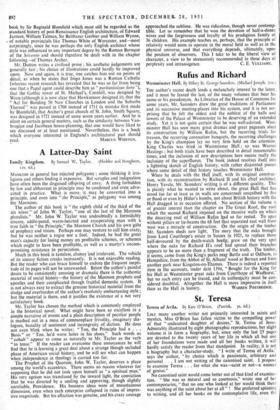A Latter-Day Saint
Family Kingdom. ts. 6d.) MANKIND in general has rejected polygamy ; some thinking it irre- ligious and others finding it expensive. But scruples and indignation have often been the disguised offspring of envy., A thing forbidden by law and abhorrent in principle may be condoned and even advo- cated in practice. What is more, it may be converted into a principle, and even into "the Principle," as polygamy was among the Mormons.
The author of this book is "the eighth child of the third of the six wives" of John W. Taylor, "one of the last of the Mormon pluralists." Mr. John W. Taylor was undoubtedly a formidably sincere, addle-pated, warm-hearted and exasperating man with a true faith in "the Principle," the Mormon Church and his own'gifts of prophecy and vision. Perhaps one may venture to call him crazy, but he was neither a rogue nor a fool. Indeed, he had the great man's capacity for losing money on profitable schemes, or schemes which ought to have been profitable, as well as a martyr's uncom- promising resistance to persecution.
Much in this book is tasteless, clumsy and irrelevant. The vehicle of its uneasy fiction creaks inCessantly. It is not enjoyable reading. But the reader who can brace himself to endure the frequent inepti- tude of its pages will not be unrewarded.- Below the author's painful desire to be consistently amusing or dramatic there is the authentic material of social history—the history of the Mormon prophets and apostles and their complicated though fruitful domestic system. It is not always easy to extract the genuine historical material from the sludge and overburden of the author's resolutely embarrassing style ; but the material is there, and it justifies the existence of a not very satisfactory book.
Mr. Taylor has chosen the method which is commonly employed in the historical novel. What might have been so excellent in a simple narrative of events and a plain description of peculiar people is mashed out in a mess of commonplace frivolity, imaginary dia- logues, banality of sentiment and incongruity of diction. He does not even blink when he writes: "Too, the Principle had a . . . Basis" or "Too, he'd worn holes in his shoes." Such words as • " cohab " appear to come as naturally to Mr. Taylor as the verb "to tense." If the reader can overcome these annoyances he will find that he is learning a great deal about a strange though secluded phase of American social history, and he will see what can happen when independence in theology is carried too far. The Prophet of the Quorum, John W. Taylor, deserves a place among the world's eccentrics. There seems no reason whatever for supposing that he did not look upon himself as "a spiritual man." His very egoism was transfused by the inward light, the conviction that he was directed by a smiling and approving, though slightly unreliable, Providence. His business ideas were of mountainous dimension, even when each enterprise collapsed in ruins of impres- sive magnitude. But his affection was genuine, and his crazy courage approached the sublime. He was ridiculous, though never contemp- tible. Let us remember that he won the devotion of half-a-dozen wives and the forgiveness and loyalty of his prodigious family of 36 children. His example teaches us, perhaps, that the principle of relativity would seem to operate in the moral field as well as in the physical universe, and that everything depends, ultimately, upon the position of observers. This I take to be the liberal view of character, a view to be strenuously recommended in these days of






























 Previous page
Previous page